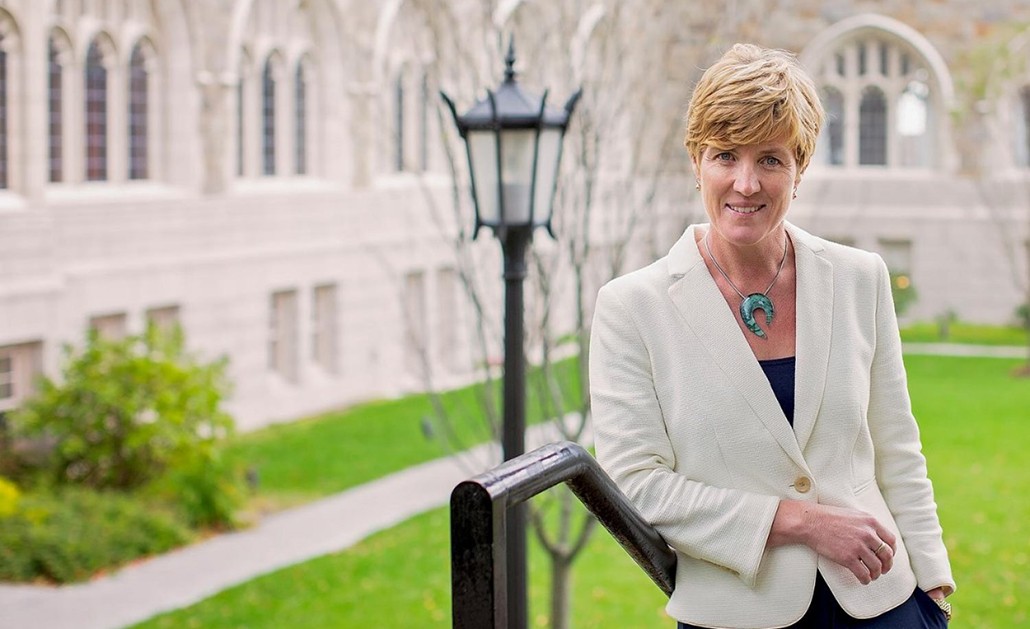
Kirsten Davison, the Donahue and DiFelice Endowed Professor and associate dean for research in the School of Social Work.
Nearly 20 percent of children in the United States have obesity, according to the Centers for Disease Control and Prevention. Studies show that children who are significantly overweight tend to be more likely to struggle in school and less likely to develop an interest in learning compared to their leaner peers. And a large body of research suggests that childhood obesity often leads to heart disease, cancer, and Type 2 diabetes later in life.
“There’s evidence to suggest that the life expectancy of our current generation of children is less than that of their parents, and obesity is thought to be a very big reason for that,” says Kirsten Davison, a researcher at Boston College whose scholarship focuses on helping families adopt healthy lifestyles.
“We used to think that the negative effects of obesity were largely experienced during adulthood, but we now know that is not the case,” adds Davison, the Donahue and DiFelice Endowed Professor and associate dean for research in the School of Social Work. “We see elevated blood glucose levels early in life as a result of higher levels of fat in the body, which has implications for the development of diabetes and other diseases.”
Davison recently received a fellowship from the Institute for Implementation Science Scholars to help her tackle a project to ensure that parents and educators are equipped with strategies and resources to keep children fit and healthy.
The Institute for Implementation Science Scholars, a program at Washington University in St. Louis, trains researchers to improve the adoption of evidence-based practices that have proven to reduce chronic diseases such as cancer, diabetes, and obesity. As a fellow for the next two years, Davison will develop the skills to design high-quality grant proposals for her project and disseminate training materials that put research into practice in communities across the country.
“There’s evidence to suggest that the life expectancy of our current generation of children is less than that of their parents, and obesity is thought to be a very big reason for that.”
Her mentor in the program, Shiriki K. Kumanyik, a profesor emeritus of epidemiology at the University of Pennsylvania, will help Davison refine a grant proposal to update and improve a compendium of evidence-based interventions that enhance the capacity of parents to provide children with the care they need to learn, develop, and stay healthy.
The National Center on Parent, Family, and Community Engagement created the collection of interventions to disseminate them through Head Start, a national program that has educated more than 36 million children from birth to age 5 since it began in 1965. But Davison says none of the interventions, delivered by Head Start to families in the program, focus on strategies that caregivers and educators can employ to improve the health of children.
In partnership with the National Center on Parent, Family, and Community Engagement, Davison wants to expand and update the compendium to include interventions that target the health of children and feature new interventions made available since the compendium was first published in 2015. She also wants to survey Head Start programs to examine the extent to which they implement evidence-based interventions and interview leaders who determine which interventions to use.
“Head Start is a really important program to reach underserved families with young children, and we know that you have to start early to prevent obesity,” says Davison, who is currently working to fine-tune her grant proposal for the project. “A really unique thing about Head Start is that it integrates education and health, and the overall goal is to work in partnership with the program to help get families off to a running start.”
Davison plans to share what she learns at the Institute for Implementation Science Scholars with her colleagues in the School of Social Work. “I’m in a key role where I can bring what I learn to the faculty here,” she says. “I can be the trainer, reach faculty in the process, and help to argue to bring implementation science resources to BC.”


